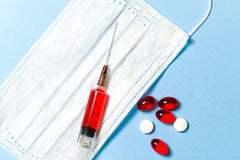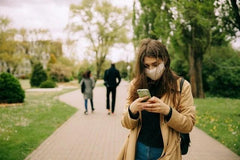Are Covid Vaccines a Full-Proof Shield Against Coronavirus?
Blog Joseph Varughese | Photo Yaroslav Danylchenko | Pexels
Reset - The New Normal
The entire world has been living in fear of the Coronavirus pandemic commonly known as Covid-19 for more than one year now. The pandemic has changed the way we were doing things till one year back making many things that would have been otherwise labeled abnormal become normal. The new ways of life like sanitization of hands and body, keeping social distance, wearing a face mask, working from home, avoiding crowds, shopping online, watching movies and series on OTT, etc., etc. have become the new normal with no sight of going back to the old ways of life very soon.
It is estimated that about 150+ million people got affected by Coronavirus as of the end of April 2021, of which 90+ million recovered and 3+ million succumbed to death. As of April end, around 280 million people around the world were fully vaccinated and 600+ million received at least one dose of vaccination.
How do Covid -19 Vaccines Work?
Vaccines work by mimicking infectious viruses, bacteria or other microorganisms that can cause disease. This ‘teaches’ our immune system to rapidly and effectively respond against it. This is how UNICEF has explained how vaccines work.
Most vaccines have done this by introducing a weakened form of an infectious agent that allows our immune system to build a memory of it. This way, our immune system can quickly recognize and fight the virus or bacteria or such other agents before it makes us ill. That’s how some of the COVID-19 vaccines have also been designed and developed.
Some COVID-19 vaccines have been developed using new approaches different from the conventional method, which are called messenger RNA, or mRNA, vaccines. Instead of introducing antigens (a substance that causes your immune system to produce antibodies), mRNA vaccines give our body the genetic code it needs to allow our immune system to produce the antigen itself. mRNA vaccine technology has been studied for several decades. They contain no live virus and do not interfere with basic human DNA.

Many vaccines have been developed, tested and introduced for public use. There are varying claims on the efficacy of these vaccines. There have also been cases reported of vaccine receivers developing complications like blood clotting after vaccinations. There is also no certain surety on the validity of these vaccines. All these affirmations would come out only over a while. For example, the validity or longevity can be measured only on the passage of time.
WHO says in its portal “ Vaccines are a critical new tool in the battle against COVID-19 and it is hugely encouraging to see so many vaccines available after trials”. The effectiveness of the vaccine varies and many have claimed to be effective up to 70% to 100%; Pfizer and Moderna claiming 95-100% efficacy to India’s Covaxin and Covishield claiming 80-85% efficacy. Working as quickly as they can, scientists from across the world are collaborating and innovating to bring us tests, treatments and vaccines that will collectively save lives and end this pandemic.
Can we be complacent after vaccination?
It may seem scary and disappointing, but health officials say that vaccines are no sure shield against Covid-19 and even after you get vaccinated, you still need to practice the usual pandemic precautions and protocols, at least for a while. That means steering clear of crowds, continuing to wear a good face mask properly in public, maintaining 6 feet or more of distance from people outside your household and frequently washing or sanitizing your hands.

Several medical experts have concurred among themselves that vaccination against COVID-19 "does not produce a shield" against the deadly virus, but helps reduce the severity of the infection and chances of mortality. This is not giving a license to live the life the way we were doing before Covid but is not unimportant as it might reduce the death rate. There is a general consensus among health experts and doctors that though vaccines may not stop infections it can reduce the severity and consequently death.
Health experts have also opined “ many people after getting vaccinated think that now they are immune to getting the infection. So they either do not wear a mask or wear it improperly. The virus first attacks the nasal passage and then the chest region. So if the mouth and the nostrils are exposed, chances are high that a person, after vaccination, may still get infected,". Add to it the aerosol effect where viruses stay in and travel through air and enter the human body through nose or mouth if not protected properly.
Also, the individual immunity level and associated co-morbidities could be a factor when it comes to getting infected after the first or the second dose of the vaccine, a doctor said, adding, "Our mask is our best vaccine now."
Adding to the challenge is the fact the virus has been mutating and generating new variants. While medical and pharmaceutical industry experts debate over the efficacy of vaccines, many doctors doubt that as the coronavirus has been mutating, it will affect the efforts to detect the infection, develop vaccination and capability to develop herd immunity. So far, a UK strain, Brazil and South African variants and a double mutant of the virus have been reported in many parts of the world.

The Only Constant is Change
Dubbed B.1.1.7, the UK variant was first identified in the fall of 2020. It spreads more easily and quickly than other variants, according to the CDC, and potentially is 30% more lethal than the wildtype version, although that is still being investigated. It was first detected in the U.S. at the end of December 2020.
Doctors and Health experts are worried that coronavirus may end up being like influenza, which requires a new vaccine every year both because the circulating strains mutate fast and because immunity from the vaccine wears off quickly.
Although initial evidence suggests immunity from vaccination against coronavirus provides long-lasting protection, vaccine makers have begun making and testing versions of their vaccines that protect against worrying variants of the virus.
India’s Hyderabad-based doctor Lakshmi Lavanya Alapati replied to his tweet on the microblogging platform, saying, "After both doses are administered, antibodies develop and severity of infection and chances of death are lowered. There is an 85% reduction in chances of hospitalisation after vaccination. But vaccines cannot prevent the virus from entering your body - only masks can stop virus entry."
Safe and effective vaccines will be a gamechanger: but for the foreseeable future, we must continue wearing masks, sanitizing hands and body, physically distancing and avoiding crowds. Being vaccinated does not mean that we can throw caution to the wind and put ourselves and others at risk, particularly because it is still not clear the degree to which the vaccines can protect not only against disease but also against infection and transmission. Wearing a mask not only protects you but others from getting affected too which in turn reduces social spread of the deadly virus.
. . .
The FluShields team hopes this article will enrich your minds and help you in your walk of life. Feel free to send us an email or leave us a positive and constructive comment here or in the original blog post. Peace and blessings.







Amazing piece of work and intriguing piece of writing.